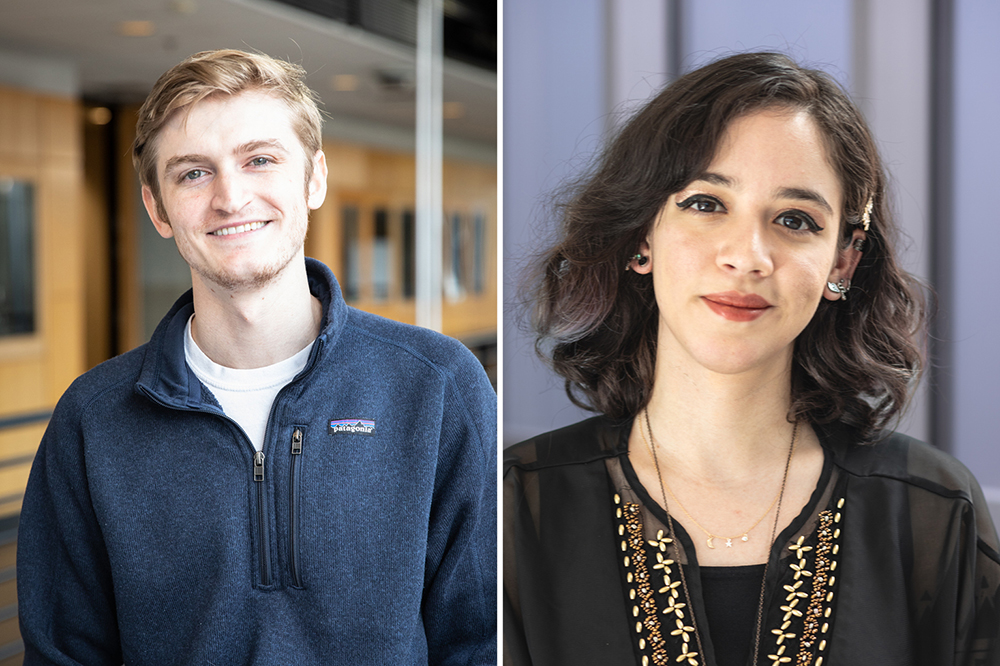
Students Receive Woodruff School First Generation Fellowships
February 8, 2023
By Ian Sargent
Jesse Bruner and Carolina Colón, graduate students in the George W. Woodruff School of Mechanical Engineering, recently received the Woodruff School First Generation Fellowship. Sponsored by 3M and Shell, the fellowship provides $2,500 in funding to first-generation graduate students who demonstrate excellence in academics and research.
Jesse Bruner is a first-year Ph.D. student studying nuclear engineering. Originally from Orlando, Florida, Bruner spent two years working in the Washington state area, including a stint with the Pacific Northwest National Laboratory.
“It’s nice to receive the fellowship,” Bruner said. “I was moving from across the country, which was costly, and not having to pay anything out of pocket for the first semester was really helpful and allowed me get started here at Georgia Tech with smooth transition.”
With one semester completed, Bruner says he enjoys the quality of his classes and connections he has been able to make with peers and faculty in the Nuclear & Radiological Engineering and Medical Physics program.
“I have already learned so much just being here,” said Bruner. “The program provides lots of opportunities for me to travel to conferences, to apply for other sources of funding, and meet people at other labs; it's been a lot of good things.”
Recently Bruner attended a conference at the Oak Ridge National Laboratory in Tennessee. He is also involved in a current project at Lawrence Livermore National Laboratory in California, where he’s studying pulse shape discrimination for antineutrino detectors.
Bruner, who is also a bassoonist with the Georgia Tech Symphonic Band, has found interests in diagnostic imaging, radiation therapy and nuclear propulsion. After graduation Bruner hopes to continue working in a national lab.
Carolina Colón is a first-year bioengineering Ph.D. student. Originally from Quebradillas in northwest Puerto Rico, Colón says monetary awards like the Woodruff School First Generation Fellowship mean she, for the first time, can focus on her studies and research without the need for a fulltime job.
“If I did not work 50-something hours, I would not have been able to attend school at all,” Colón said. “So even $500 or $1,000 can be the difference between being able to go to school versus having to delay by another semester.”
For Colón, the fellowship is not just an appreciation of her personal academic achievements, but of a significant acknowledgment of the diverse challenges first-generation students face in higher education settings.
“It's kind of like a ‘we hear you; we see you’ kind of thing,” Colón said.
Colón’s academic focus blends her aeronautical engineering background with CAR-T cell therapies. Her long-term goal is to develop methods for implementing cell therapies on a large scale, and eventually creating the means to make the technology available to astronauts on hazardous long-duration missions.
“It has a lot of potential to be a one size fits all therapy,” Colón said. “Right now, these therapies cost close to half a million dollars, making treatments inaccessible to most of the population, so one of the few ways you can bring the price down is by scaling their manufacturing.”
Doing so first requires extensive research into T-cell biology and resiliency, which Colón is hoping to incorporate into her dissertation.
The Woodruff School First Generation Fellowship was established by Shell in 2020 and is part of a continued effort by the Woodruff School to provide a broad range of funding opportunities for current students.
